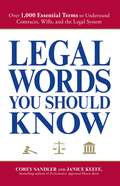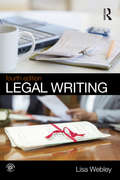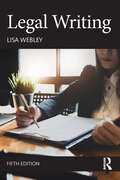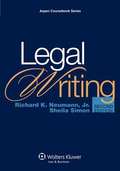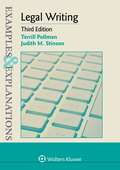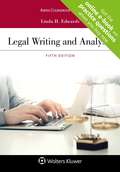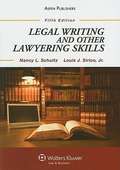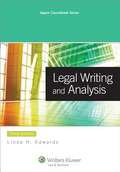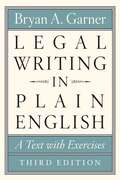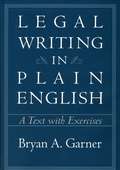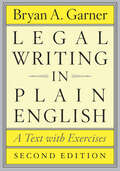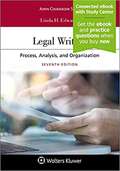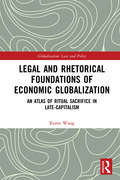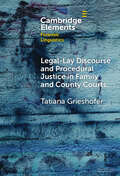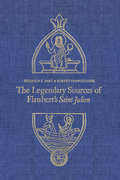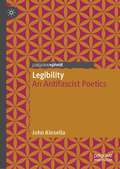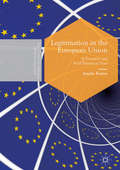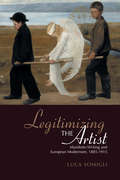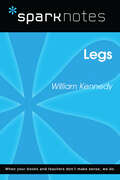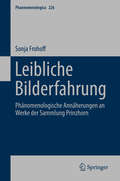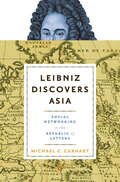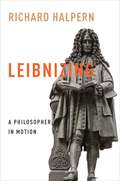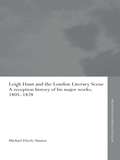- Table View
- List View
Legal Words You Should Know: Over 1,000 Essential Terms to Understand Contracts, Wills, and the Legal System
by Corey Sandler Janice KeefeEvery day, people find themselves in legal situations. Mortgages are put in place, attorneys draw up wills, and credit cards are set up all the time. However, how many people actually understood the legal contracts they were signing? There's no excuse for being ignorant of the law when it comes to a dispute with a bank, a mortgage lender, or a lawyer. This book defines 1,000 essential words from the worlds of civil law, estates, lending, and elder affairs, such as abatement, residuary beneficiary, trust deed, variable rate mortgage, right of rescission, and more. Each word will be clearly defined, and includes a pronunciation key and an example of usage. This guide ensures you will know the law in no time!
Legal Writing
by Lisa WebleyLegal Writing guides students comprehensively through this vital legal skill and addresses a range of assessment methods from exam questions to final essays and problem answers. It considers how to deconstruct essay and problem questions and how to conduct and apply legal research to answer set questions. Lisa Webley explains how to reference others' work clearly and correctly, making this book a useful tool for students concerned about issues of plagiarism. It also focuses on how to develop critical thinking and communicate legal arguments, with both good and bad examples of written work considered and discussed in the text. Legal Writing is particularly useful for undergraduate students, especially at the beginning of degree studies, and for GDL and CPE students too. This fully revised fourth edition includes: Guidance on the avoidance of plagiarism including examples of poor practice and best practice. Worked examples throughout the text, including guidance on deciphering essay questions in exams and coursework, along with additional examples from across the legal curriculum on the companion website. An improved companion website with increased guidance for revision to allow students to test their progress and further engage with the topics in the book. Clearly written and easy to use, Legal Writing enables students to fully engage with essay and exam writing as a vital foundation to their undergraduate degree.
Legal Writing
by Lisa WebleyLegal Writing guides students comprehensively through this vital legal skill and addresses a range of assessment methods from exam questions to final essays and problem answers. It considers how to deconstruct essay and problem questions and how to conduct and apply legal research to answer set questions. Lisa Webley explains how to reference others’ work clearly and correctly, making this book a useful tool for students concerned about issues of plagiarism. Legal Writing also focuses on how to develop critical thinking and communicate legal arguments, with both good and bad examples of written work considered and discussed in the text. Legal Writing is particularly useful for undergraduate students, especially at the beginning of degree studies, as well as for those preparing for the SQE exams. This fully revised fifth edition includes: Guidance on how to avoid plagiarism, including examples of the best and worst practices Worked examples throughout the text, including how to decipher essay questions in exams and coursework An expanded set of accompanying digital learning resources with increased guidance for revision to allow students to test their progress and further engage with the topics in the book. Clearly written and easy to use, Legal Writing enables students to fully engage with essay and exam writing as a vital foundation to their undergraduate degree.
Legal Writing (2nd Edition)
by Sheila J. Simon Richard K. Neumann Jr.Written for law students, this well-organized and thorough book shows how to hone legal writing skills in real-world situations. Topics include process, style, memoranda writing, organizing analysis (CREAC), analytical writing, persuasive writing, telling a client's story, making the client's argument, appellate briefs, and oral argument. Each chapter includes exercises. Appendices contain sample memos and briefs. An accompanying access code protected website offers supplementary material including videos, checklists, and articles. Annotation ©2011 Book News, Inc. , Portland, OR (booknews. com)
Legal Writing (Examples and Explanations)
by Terrill Pollman; Judith M. StinsonA favorite classroom prep tool of successful students that is often recommended by professors, the Examples & Explanations (E&E) series provides an alternative perspective to help you understand your casebook and in-class lectures. Each E&E offers hypothetical questions complemented by detailed explanations that allow you to test your knowledge of the topics in your courses and compare your own analysis.
Legal Writing And Analysis (Aspen Coursebook)
by Linda Holdeman EdwardsThis streamlined text offers a straightforward guide to developing legal writing and analysis skills for beginning legal writers. Legal Writing and Analysis, Fifth Edition by Linda Edwards, leads students logically through reading and analyzing the law, writing the discussion of a legal question, and writing office memos, letters, and briefs. The text includes chapters on citation form, writing style, professionalism, and oral argument. <P><P> The book features special focus on forms of legal reasoning (rules, analogies, policies, principles, customs, inferences, and narrative) complete with examples and exercises. It teaches students to recognize rule structures and use them to organize their document. <P><P> New to the Fifth Edition: Streamlined chapters and exercises Updated citation materials covering current editions of both citation manuals Product page featuring more material on professional letters and accessible coverage and use of legal theory <P><P>Professors and students will benefit from: Contextual learning, including important legal method material Superior treatment of how to organize a legal discussion Clear, ample coverage of legal reasoning Practice-oriented approach Numerous examples and short exercises for formative assessment Strong coverage of professional responsibility
Legal Writing And Other Lawyering Skills, 5e
by Nancy L. Schultz Louis J. Sirico Jr.With a consistent emphasis on precision and good organization, Legal Writing and Other Lawyering Skills, Fifth Edition, shows students how tod raft memoranda, opinion letters, pleadings, briefs, and other legal documents. But because communication in the practice of law occurs in specificcontexts, authors Nancy L. Schultz and Louis J. Sirico, Jr . teach other valuable lawyering skills, such as client counseling, negotiating,and how to present an oral argument before the court, in this timely andstudent-friendly text. Now with a more contemporary look that reflects a new publisher and revisions requested by users of the text, the Fifth Edition of Legal Writing and Other Lawyering Skills features: a straightforward and student-friendly approach, framed and supported by a logical organization, streamlined coverage that focuses on basic communication skills in practice, complete coverage of legal writing--with outstanding chapters on writing style and how to write a memo, in-depth instruction on legal analysis, oral argument, and how to write an appellate brief, a helpful preliminary overview of the American legal system, refreshed, updated, and carefully honed practice exercises, expanded coverage of electronic research, new coverage of electronic communication, format, etiquette, ethics, and liability, thoroughly up-to-date court citations, cases, and sample documents, generous use of sample documents within the text and in the Appendices. The focused exercises and examples in Legal Writing and Other Lawyering Skills, Fifth Edition, simulate the tasks performed by lawyers in practice and reflect the authors' forward-looking, practice-based approach to teaching writing and lawyering skills to law students.
Legal Writing and Analysis (Third Edition)
by Linda H. EdwardsIdeal for beginning legal writers, this logically organized and exceptionally well-written text offers a concise and straightforward guide to legal writing and analysis. Updated to include exercises with increased focus on first-year courses, Legal Writing and Analysis, Second Edition, starts with an overview of the legal system and the lawyer¿s role, then leads students from reading and analyzing the law through the process of legal writing, providing numerous examples and exercises along the way. Classroom-tested features of this bestselling text include: a consistent use of the legal method approach, from an opening chapter providing an overview of a civil case and the lawyer¿s role, to information about the legal system, case briefing, synthesizing cases, and statutory interpretation an emphasis on analogical reasoning and synthesizing cases, as well as rule-based and policy-based reasoning, with explanations of how to use these types of reasoning to organize a legal discussion a logical organization that starts with reading and analyzing the law and then moves on to writing the discussion of a legal question, writing an office memo and professional letters, and advocacy writing. chapters addressing style and formality considerations as well as oral advocacy effective coverage of the use of precedent a superior discussion of small-scale organization, including the thesis paragraph numerous examples and frequent short exercises that encourage students to apply concepts a comprehensive Teacher¿s Manual that offers helpful advice for instructors. The Second Edition offers new exercises, including increased focus on first-year courses. a revision of Part Five on advocacy writing, streamlining the order of the chapters and adding more coverage of questions presented an updated citation chapter. Chapter 12 on the Office Memorandum has been expanded to add another format for a question presented and is accompanied by an example
Legal Writing in Plain English, Third Edition: A Text with Exercises (Chicago Guides to Writing, Editing, and Publishing)
by Bryan A. GarnerThe leading guide to clear writing—and clear thinking—in the legal profession for more than two decades, now newly updated. Admirably clear, concise, down-to-earth, and powerful—all too often, legal writing embodies none of these qualities. Its reputation for obscurity and needless legalese is widespread. Since 2001, Bryan A. Garner’s Legal Writing in Plain English has helped address this problem by providing lawyers, judges, paralegals, law students, and legal scholars with sound advice and practical tools for improving their written work. Now the leading guide to clear writing in the field, this indispensable volume encourages legal writers to challenge conventions and offers valuable insights into the writing process: how to organize ideas, create and refine prose, and improve editing skills. Accessible and witty, Legal Writing in Plain English draws on real-life writing samples that Garner has gathered through decades of teaching experience. Trenchant advice covers all types of legal materials, from analytical and persuasive writing to legal drafting, and the book’s principles are reinforced by sets of basic, intermediate, and advanced exercises in each section. For this third edition, Garner has retained the structure of the previous versions, with updates and new material throughout. There are new sections on making your writing vivid and concrete and on using graphics to enhance your argument. The coverage and examples of key topics such as achieving parallelism, avoiding legalese, writing effective openers and summaries, and weaving quotations into your text have also been expanded. And the sample legal documents and exercises have been updated, while newly added checklists provide quick summaries of each section. Altogether, this new edition will be the most useful yet for legal professionals and students seeking to improve their prose.
Legal Writing in Plain English: A Text with Exercises
by Bryan A. GarnerAdmirably clear, concise, down-to-earth, and powerful-- unfortunately, these adjectives rarely describe legal writing, whether in the form of briefs, opinions, contracts, or statutes. In Legal Writing in Plain English, Bryan A. Garner provides lawyers, judges, paralegals, law students, and legal scholars sound advice and practical tools for improving their written work. The book encourages legal writers to challenge conventions and offers valuable insights into the writing process: how to organize ideas, create and refine prose, and improve editing skills. In essence, it teaches straight thinking-- a skill inseparable from good writing. Replete with common sense and wit, the book draws on real-life writing samples that Garner has gathered through more than a decade of teaching in the field. Trenchant advice covers all types of legal materials, from analytical and persuasive writing to legal drafting. Meanwhile, Garner explores important aspects of document design. Basic, intermediate, and advanced exercises in each section reinforce the book's principles. (An answer key to basic exercises is included in the book; answers to intermediate and advanced exercises are provided in a separate Instructor's Manual, free of charge to instructors.) Appendixes include a comprehensive punctuation guide with advice and examples, and four model documents. Today more than ever before, legal professionals cannot afford to ignore the trend toward clear language shorn of jargon. Clients demand it, and courts reward it. Despite the age-old tradition of poor writing in law, Legal Writing in Plain English shows how legal writers can unshackle themselves. Legal Writing in Plain English includes: *Tips on generating thoughts, organizing them, and creating outlines. *Sound advice on expressing your ideas clearly and powerfully. *Dozens of real-life writing examples to illustrate writing problems and solutions. *Exercises to reinforce principles of good writing (also available on the Internet). *Helpful guidance on page layout. *A punctuation guide that shows the correct uses of every punctuation mark. *Model legal documents that demonstrate the power of plain English.
Legal Writing in Plain English: A Text with Exercises (Chicago Guides to Writing, Editing, and Publishing)
by Bryan A. Garner“This easy-to-follow guide is useful both as a general course of instruction and as a targeted aid in solving particular legal writing problems.” —Harvard Law ReviewClear, concise, down-to-earth, and powerful—all too often, legal writing embodies none of these qualities. Its reputation for obscurity and needless legalese is widespread. For more than twenty years, Bryan A. Garner’s Legal Writing in Plain English has helped address this problem by providing lawyers, judges, paralegals, law students, and legal scholars with sound advice and practical tools for improving their written work. The leading guide to clear writing in the field, this indispensable volume encourages legal writers to challenge conventions and offers valuable insights into the writing process that will appeal to other professionals: how to organize ideas, create and refine prose, and improve editing skills.Accessible and witty, Legal Writing in Plain English draws on real-life writing samples that Garner has gathered through decades of teaching. Trenchant advice covers all types of legal materials, from analytical and persuasive writing to legal drafting, and the book’s principles are reinforced by sets of basic, intermediate, and advanced exercises in each section.In this new edition, Garner preserves the successful structure of the original while adjusting the content to make it even more classroom-friendly. He includes case examples from the past decade and addresses the widespread use of legal documents in electronic formats. His book remains the standard guide for producing the jargon-free language that clients demand and courts reward.“Those who are willing to approach the book systematically and to complete the exercises will see dramatic improvements in their writing.” —Law Library Journal
Legal Writing: Process, Analysis, And Organization (Aspen Coursebook)
by Linda H. EdwardsBuy a new version of this textbook and receive access to the Connected eBook with Study Center on CasebookConnect, including: lifetime access to the online ebook with highlight, annotation, and search capabilities; practice questions from your favorite study aids; an outline tool and other helpful resources. Connected eBooks provide what you need most to be successful in your law school classes. Learn more about Connected eBooks Legal Writing: Process, Analysis, and Organization, Seventh Edition by the 2017 Burton Award recipient and renowned author, Linda Edwards, is the only legal writing text that uses a process approach, presenting writing as a logical sequence of steps. Streamlined to meet the needs of today’s students, the Seventh Edition uses adult learning theory concepts and a “flipped classroom” approach to add even greater focus and efficiency to classroom and study time. Key Features: New Chapter (4) on working with statutes. Updated chapter on citation Improved coverage of brief-writing Streamlined chapter on letter writing to better meet the need of a first-year course. Modern process approach, with streamlined content for better absorption by students Clear and informal language Helpful appendices offering sample of office memos, sample letters, and appellate briefs.
Legal and Rhetorical Foundations of Economic Globalization: An Atlas of Ritual Sacrifice in Late-Capitalism (Globalization: Law and Policy)
by Keren WangThis book examines the subtle ways in which rhetorics of sacrifice have been re-appropriated into the workings of the global political economy in the 21st century. It presents an in-depth analysis of the ways in which ritual practices are deployed, under a diverse set of political and legal contexts, as legitimation devices in rendering exploitative structures of the prevailing political-economic system to appear inescapable, or even palatable. To this end, this work explores the deeper rhetorical and legal basis of late-capitalist governmentality by critically interrogating its mythical and ritual dimensions. The analysis gives due consideration to the contemporary incarnations of ritual sacrifice in the transnational neoliberal discourse: from those exploitative yet inescapable contractual obligations, to calendrical multi-billion dollar 'offerings' to the insatiable needs of 'too-big-to-fail' corporations.The first part of the book provides a working interpretative framework for understanding the politics of ritual sacrifice – one that not only accommodates multidisciplinary, interdisciplinary knowledge of ritual practices, but that can also be employed in the integrated analysis of sacrificial rituals as political rhetoric under divergent historical and societal contexts. The second conducts a series of case studies that cut across the wide variability of ritual public takings in late-capitalism. The book concludes by highlighting several key common doctrines of public ritual sacrifice which have been broadly observed in its case studies. These common doctrines tend to reflect the rhetorical and legal foundations for public takings under hegemonic market-driven governance. They define 'appropriate and proper' occasions for suspending pre-existing legal protections to regularize otherwise transgressive transfers of rights and possessions for the 'greater good' of the economic order.
Legal-Lay Discourse and Procedural Justice in Family and County Courts (Elements in Forensic Linguistics)
by Tatiana GrieshoferFocusing on adversarial legal settings, this Element explores discursive practices in court proceedings which often involve unrepresented parties – private family proceedings and small claims cases. Such proceedings present the main caseload of county and family courts, but pose immense challenges when it comes to legal-lay communication. Drawing on court observations, alongside textual and interview data, the Element pursues three aims: (1) developing the methodological and theoretical framework for exploring discursive practices in legal settings; (2) establishing the link between legal-lay discourse and procedural justice; (3) presenting and contextualising linguistic phenomena as an inherent part of court research and practice. The Element illustrates how linguistic input can contribute to procedural changes and court reforms across different adversarial and non-adversarial legal settings. The exploration of discursive practices embedded in court processes and procedures consolidates and advances the existing court research conducted within the fields of socio-legal studies and forensic linguistics. This title is also available as Open Access on Cambridge Core.
Legendary Lionesses: The England Women’s Football Team, 1972–2022
by Jean WilliamsThis is the first academic history of the FA England women’s national football team. Based on unprecedented access to FA data, it details the careers of the 227 women who debuted for England from 1972 to 2022. England won the UEFA Women’s Euros in 2022, and Jean worked with Sarina Wiegman and the squad, on the Legendary Lionesses from 1972.
Legendary Sources of Flaubert's Saint Julien
by Benjamin F. Bart Robert Francis CookThe sources for La Légende de Saint Julien l'Hospitalier, one of Flaubert's finest literary works, have long been the subject of numerous conflicting theories. The implications of the controversy are broad and important, not only for Flaubert's work but also for our understanding of how writers generally use traditional material. Superficial resemblances have led critics to conclude that Flaubert relied heavily on a medieval tale of Saint Julian and that he borrowed details and specific phrases from his medieval predecessor. This book, by a world renowned specialist in Flaubert studies and a medieval philologist, demonstrates that the Légende is not medieval in structure or in spirit, and that its conception is distinctly modern; where Flaubert borrowed at all he used contemporary sources to recast the Julian legend in Romantic style. Bart and Cook establish definitely what legendary sources were and show how Flaubert came into contact with them. Their extensive commentary compares the sources and the Légende in detail, explains the circumstances under which Flaubert used his materials, and analyses how they were woven into the texture of his own tale. The book makes available source material scattered throughout obscure periodicals, reproduces accurately and dates correctly important segments of Flaubert's drafts and scenarios, and provides the first modern printed edition of the Alençon life of Saint Julian which Lecointre-Dupont adapted in 1838, thereby giving Flaubert indirect access to the old tale.An introductory chapter explores the broader question of the development of legends and how a particular legendary sequence, embodying powerful themes, was amplified and made explicit from the twelfth century to Flaubert's time.
Legibility: An Antifascist Poetics (Modern and Contemporary Poetry and Poetics)
by John KinsellaThis Pivot book provides a wide-ranging and diverse commentary on issues of legibility (and illegibility) around poetry, antifascist pacifist activism, environmentalism and the language of protest. A timely meditation from poet John Kinsella, the book focuses on participation in protest, demonstration and intervention on behalf of human rights activism, and writing and acting peacefully but persistently against tyranny. The book also examines how we make records and what we do with them, how we might use poetry to act or enact and/or to discuss such necessities and events. A book about community, human and animal rights and the way poetry can be used as a peaceful and decisive means of intervention in moment of public social and environmental crisis. Ultimately, it is a poetics against fascism with a focus on the well-being of the biosphere and all it contains.
Legitimacy and Illegitimacy in Nineteenth-Century Law, Literature and History
by Jenny Bourne Taylor Margot Finn Michael LobbanThis innovative collection of essays by prominent scholars from the disciplines of literary studies, history and law explores the many ways in which notions of legtitimacy were shaped and contested in Georgian and Victorian Britain. It probes the difficulties of drawing boundaries between the legitimate and the illegitimate which continued to trouble Victorian society and which were explored in novels such as Charles Dickens's Bleak House and Wilkie Collins's The Woman in White. The essays in this collection show how dilemmas over legitimacy unsettled families by challenging clear lines of inheritence; they also unsettles society, as forgers and imposters defrauded individuals, estates and institutions through widely publicised social performances which fascinated both contemporary culture and called into question the idea of legitimacy itself. "
Legitimation in the European Union: A Discourse- and Field-Theoretical View (Postdisciplinary Studies in Discourse)
by Amelie KutterThis book offers a transdisciplinary perspective on the question of how political legitimacy is constructed in the increasingly contested postnational setting of the European Union. Drawing on the example of the controversy about the EU constitution and the use of ‘EU constitution speak’ in commentaries published by Polish and French broadsheets, it reveals the transformation that constructions of political authority and association undergo when they are being transposed from the discourse field of multilateral negotiation to that of national news media. Through an original combination of the linguistic theory of discourse developed in Critical Discourse Analysis, Bourdieu’s field theory and notion of symbolic power, and political thought on polity-building, it develops a framework for the discourse study of legitimation and Europeanisation, and proposes applications beyond the case studies in the book.To students of European integration, it demonstrates the potential these concepts have for unravelling the implicit practices of postnational polity building. Discourse researchers, on the other hand, will discover how detailed text analyses gain significance in debates related to the macro level of political organisation when guided by sociological and political theory.
Legitimizing the Artist
by Luca SomigliIn the late nineteenth and early twentieth centuries, the production of literary and cultural manifestoes enjoyed a veritable boom and accompanied the rise of many avant-garde movements. Legitimizing the Artist considers this phenomenon as a response to a more general crisis of legitimation that artists had been struggling with for decades. The crucial question for artists, confronted by the conservative values of the dominant bourgeoisie and the economic logic of triumphant capitalism, was how to justify their work in terms that did not reduce art to a mere commodity.In this work Luca Somigli discusses several European artistic movements - decadentism, Italian futurism, vorticism, and imagism - and argues for the centrality of the works of F.T. Marinetti in the transition from a fin de siécle decadent poetics, exemplified by the manifestoes of Anatole Baju, to a properly avant-garde project aiming at a complete renewal of the process of literary communication and the abolition of the difference between producer and consumer. It is to this challenge that the English avant-garde artists, and Ezra Pound in particular, responded with their more polemical pieces. Somigli suggests that this debate allows us to rethink the relationship between modernism and post-modernism as complementary ways of engaging the loss of an organic relationship between the artist and his social environment.
Legs (SparkNotes Literature Guide Series)
by SparkNotesLegs (SparkNotes Literature Guide) by William Kennedy Making the reading experience fun Created by Harvard students for students everywhere, SparkNotes is a new breed of study guide: smarter, better, faster. Geared to what today's students need to know, SparkNotes provides: *Chapter-by-chapter analysis *Explanations of key themes, motifs, and symbols *A review quiz and essay topicsLively and accessible, these guides are perfect for late-night studying and writing papers
Leibliche Bilderfahrung: Phänomenologische Annäherungen an Werke der Sammlung Prinzhorn (Phaenomenologica #226)
by Sonja FrohoffWas ist Wahnsinn und was ist Kunst? In dem Buch wirft die Autorin einen neuen Blick auf Kunstwerke aus der weltberühmten Sammlung Prinzhorn in Heidelberg. Die Werke, die um das Jahr 1900 von Patienten in psychiatrischen Einrichtungen geschaffen wurden, werden erstmals aus einer phänomenologischen Perspektive heraus betrachtet. Ausgangspunkt ist die Phänomenologie des Philosophen Maurice Merleau-Ponty und seines Konzepts von Leiblichkeit. Im Mittelpunkt stehen die Werke von Elisabeth Faulhaber, Carl Lange und Edmund Träger. Die Autorin befragt die Werke der drei Art-Brut-Künstler nach den darin zum Ausdruck kommenden Zeit- und Raumordnungen, nach dem Verhältnis der Künstler zu sich selbst und zur Welt. Diese Bildbetrachtungen ermöglichen es Lesern, sich den Künstlern anzunähern und ihr „Zur-Welt-Sein“ nachzuvollziehen. Das vermeintlich Kranke wird durch die Analyse der Bildsprache als existenzielle und momentane Balancefindung verstehbar. Was auf den ersten Blick fremd erscheint, wird auf Ordnungsstrukturen und Metaphernbildungen im schöpferischen Prozess zurückgeführt. So entwickelt die Autorin ein neues Verständnis von Kunst, geschaffen von Menschen in Phasen existenzieller seelischer Krisen. Sie geht damit weit über kunsthistorische Analysen auf der einen und psychiatrische Diagnosen auf der anderen Seite hinaus und stellt gängige Definitionen von Kunst und Krankheit in Frage. Die Autorin erweitert die wissenschaftliche Debatte zu Phänomenologie und Bildsprache und bringt dafür erstmals alle verfügbaren Quellen und Erkenntnisse zu den drei Vertretern der Outsider Art zusammen. Ein Buch für Phänomenologen, Kunsthistoriker, Psychiater und Psychotherapeuten, das auch interessierten Laien eine Kunstbetrachtung aus phänomenologischer Perspektive bietet.
Leibniz Discovers Asia: Social Networking in the Republic of Letters (Information Cultures)
by Michael C. CarhartHow did early modern scholars—as exemplified by Leibniz—search for their origins in the study of language?Who are the nations of Europe, and where did they come from? Early modern people were as curious about their origins as we are today. Lacking twenty-first-century DNA research, seventeenth-century scholars turned to language—etymology, vocabulary, and even grammatical structure—for evidence. The hope was that, in puzzling out the relationships between languages, the relationships between nations themselves would emerge, and on that basis one could determine the ancestral homeland of the nations that presently occupied Europe.In Leibniz Discovers Asia, Michael C. Carhart explores this early modern practice by focusing on philosopher, scientist, and mathematician Gottfried Wilhelm Leibniz, who developed a vast network of scholars and missionaries throughout Europe to acquire the linguistic data he needed. The success of his project was tied to the Jesuit search for an overland route to China, whose itinerary would take them through the nations from whom Leibniz wanted language samples. Drawing on Leibniz's extensive correspondence with the members of this network, Carhart gives us access to the philosopher's scintillating discussions about astronomy and mapping; ethnology and missionary work; the contest of the Asiatic empires of Muscovy, Persia, the Ottoman, and China for control of the Caucasus, the steppes, and the Far East; and above all, language, as the best indicator of the prehistoric genealogy of the myriad peoples from Central Asia to Western Europe.Placing comparative linguistics within Leibniz's intellectual program, this book offers extensive insight into how Leibniz built his early modern scholarly network, the network's functionality within the international Republic of Letters, and its limitations. We see the scholar, isolated and lonely in little Hanover, with his hands on knowledge trickling in from scientific centers across Europe and around the world. By the end of 1697—the year his network finally began to work—Leibniz laughed to one of his patrons, "I'm putting a sign on my door reading, 'Bureau of Address for China'!" Depicting Leibniz not as a philosophical authority but as a scholar with human limitations and frustrations, Leibniz Discovers Asia is a thrilling and engaging narrative.
Leibnizing: A Philosopher in Motion (Columbia Themes in Philosophy, Social Criticism, and the Arts)
by Richard HalpernWhy read Leibniz today? Can we still learn from him and not just about him? This book argues that Leibniz offers a powerful, productive model for transdisciplinary thinking that can push back against the narrowness of the humanities today.Richard Halpern recasts Leibniz as a great writer as well as a great philosopher, demonstrating that his philosophical project cannot be fully understood without taking its literary elements into account. He shows Leibniz to be a prescient thinker about art and beauty whose insights into the relationship between aesthetic experience and thought remain invaluable. Leibnizing asks readers to follow the dynamic movement of Leibniz’s writing instead of attempting to grasp a static philosophical system and to pay careful attention to the rhetorical and stylistic registers of Leibniz’s work as well as its conceptual and logical dimensions.For philosophers, this book offers a novel approach to reading and interpreting Leibniz. For literary and other theorists, it showcases the relevance of Leibniz’s thought to areas from aesthetics to politics and from metaphysics to computer science. Written in a lucid and even witty style, Leibnizing provides readers with an accessible entryway into Leibniz’s sometimes forbidding but ultimately rewarding philosophical vision.
Leigh Hunt and the London Literary Scene: A Reception History of his Major Works, 1805-1828 (Routledge Studies in Romanticism #Vol. 3)
by Michael Eberle-SinatraLeigh Hunt’s contributions to English literature, although downplayed for several decades, are now acknowledged by scholars as key to our understanding of the Romantic period. He was not only a facilitator - in his support for the poetry of Shelley and Keats for example - but was also a major contributor in his own right to the literary and political world of the nineteenth century. Underscoring the literary innovations in his writing during the first three decades of the nineteenth century, this text focuses on the selected works that complement the current view of Hunt as a Romantic writer and show the independence in his critical approach and use of poetic language. With an episodic, chronological approach, this is an important reassessment of Hunt’s substantial contributions to several different genres, providing a fascinating account of the significant impact of his works on audiences during the Romantic period.
